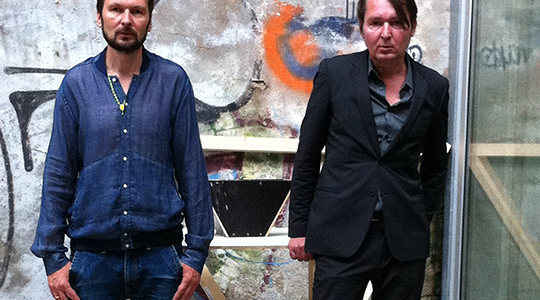Ornament & Verbrechen
[DE]

Ornament & Verbrechen is a project that informs the mythos of the pre-Wende East German underground. Formed in 1983 by brothers Ronald and Robert Lippok, the group was more phenomenon than band, an open system of experimentation with other artists and musicians that was continuous for over a decade.
Following various punk rock formations with Bernd Jestram, Ronald (drums & sampler) and Ronald (guitar & electronics) Lippok created Ornament & Verbrechen as a ‘platform’ from which to explore concepts in a wide range of styles—jazz, industrial, electronic—in different media with a rotating cast of more than two dozen visual artists, sound artists and musicians. “There is no fixed band structure—we work like mushrooms, spreading spores across the city.” (Ronald Lippok).
Inspired by Throbbing Gristle, the duo began producing and distributing their own tapes. The first recording of Ornament & Verbrechen can be found on “Live in paradise” from 1985, a sampler of recordings that had found their way to the West by bands illegal in the East. In the GDR Ornament & Verbrechen were constantly on the move in search of performance spaces, they were a ‘dissident punk band’ not officially recognized, and without papers. They performed in churches and galleries, and in the Palace of the Republic, illegally. They played acid parties with a C64 brought from the West by their grandmother (pensioners were allowed to travel).
After 1995 the Ornament & Verbrechen open-concept project faded into the background, superseded by Tarwater (Ronald Lippok/Bernd Jestram) and To Rococo Rot (Lippok/Lippok + Stefan Schneider).
The name Ornament & Verbrechen was taken from a 1908 essay of with the same title (Ornament und Verbrechen, Ornament and Crime) that was fundamental to the Bauhaus movement and helped define Modernism in architecture, though the band took the name more or less ironically.


